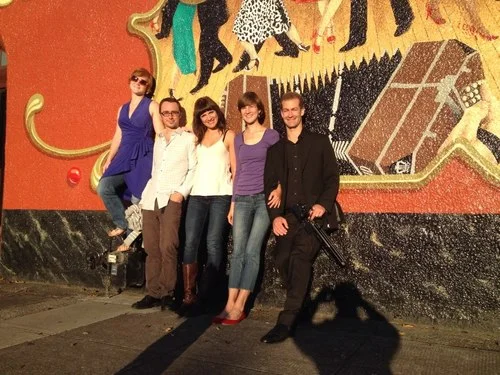Doors at 7:30 pm; Show at 8:00 pm
Tickets are $20
Pascuala Ilabaca is one of the leading performers in Chile’s new prolific scene of young singer/songwriters. Her music is rooted in traditional sounds but also incorporates jazz, pop and rock, and other musical influences gathered throughout her life in such distant places from home as India and Mexico. On stage, she has a strong visual presence, armed with her accordion and a voice that has the power to sweeten the rhythms and melodies of the band that accompanies her. Ilabaca is a two-time Independent Music Awards winner, which honors music by established and emerging talent worldwide. Pascuala Ilabaca y Fauna tours Europe extensively and will be hitting the road in September for their first US tour. The Ashkenaz show will be their Bay Area debut.
Ilabaca was born in Valparaiso, Chile in 1985 and was interested in music since childhood.
She studied music at the Pontifical University in her native city but immediately understood that she had to extricate herself from the overly stringent rules imposed by her professors. In her debut album “Pascuala canta a Violeta” (2008), full of songs based on Chilean folklore, she incorporated a Hindu table and electric guitars. “Pascuala canta a Violeta (Pascuala sings to Violeta)” was an homage to Chilean singer, Violeta Parra, her great inspiration, and a practice of recovery of the traditional sounds of her country. This action persuaded then President of Chile, Michelle Bachelet, to invite her on a tour throughout India, a country where Ilabaca had lived as a child. She settled down again in India for a year to go deeply into the sounds and rhythms of that country. From that experience, two albums were born, both in 2010. The first, “Perfume o Veneno,” (Perfume or Poison) was recorded with her side project Samadi and was strongly influenced by Hindu music. The second, already recorded with Fauna, was named “Diablo Rojo, Diablo Verde” (Red Devil, Green Devil) and explored more purely Chilean sounds as the cumbia, the trote, or the cueca. However, she did not stop adding her own ingredients from more modern recipes, some as remote from the folklore as drum’n’bass.
In 2010 Ilabaca won the Guitarpin de Oro from the Festival Huaso de Olmue and the
Audience Award for Best Chilean Videoclip for “Lamenta la Canela.” The culmination was
held at the National Stadium of Chile, where Ilabaca played before 50,000 people
alongside well-known Chilean bands like Inti Illimani. In 2011, Ilabaca went on her first
European tour: twenty concerts in Germany, France, Spain and Belgium. In 2012 she
embarked on a new European tour with a new album under her arm, “Busco Paraíso (I
Look for Paradise).”
YouTube channel: www.youtube.com/channel/UC9lkktNKU_zlnclsBG-kR0g
For the past 11 years LoCura has crafted their own unique musical identity: "Califas Mestizo Music" which is a blend of Latin American and Iberian rhythms such as rumba, cumbia, salsa and flamenco influenced by punkrock, ska, rap, dub, reggae, dancehall with local and global lyrical themes. The band's name ("it cures it") reflects their ethos of making music a remedy, a theme which permeates lyrics such as "la cultura cura la locura," cultures cures the madness. Vocalist Kata Miletich, expanding on the group's influences, notes "one big inspiration for the ways we consciously and unconsciously connect different music is this idea that styles and rhythms travel from Africa, Europe stretching across the Americas and mixing with indigenous sounds. Culture is alive in so many different ways, and shows up in different places to tell a story." LoCura has released three full length albums, performed in many places around the world and is currently writing and recording music for their fourth album.
Direct from San Francisco’s fertile music scene, LoCura taps into the diverse sounds that have a rich history in the Bay Area, weaving them together in an uncanny way to reveal their common roots. Mixing Rumba Flamenca with Reggae and Cumbia with Ska through contagious rhythms and multiple languages, their music takes you on a ride through a day in the emerging globalized experience where the movement of people and ideas are in constant flux. Reflecting lead vocalist Kata’s own experience of growing up Spanish American in Spain, Italy, and the U.S., LoCura’s music rides the borders of identity and migration piecing together a mosaic of our myriad cultures and experiences. In Spain the expression "Ida y Vuelta" is used to describe certain styles within Flamenco that made a "round-trip" from Spain to Latin America, mixing with music from the African and Indigenous populations. With this idea of music traveling and music as creative resistance, LoCura takes the trip back again mixing it up with their own Califas Flamenkito, Reggae, and Cuban Son styles. Moved by the music that crosses borders and takes root in different lands, LoCura draws from this creative 'rebelde' spirit to cultivate the cures passed on from our ancestors.
Videos: www.locuramusica.weebly.com/video.html



